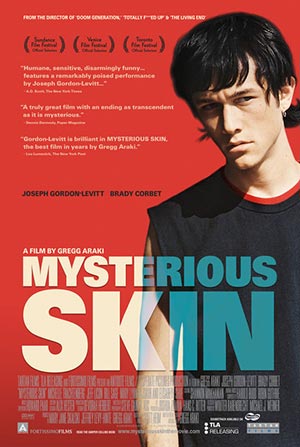 Mysterious Skin is a risk-taking film that dares to wed shock and tenderness in a saga of pedophilia and its aftereffects. That it is gentleness that finally emerges as its chief affect is due to the carefully non-sensationalized, but meticulously honest direction of Gregg Araki, who adapted Scott Heim’s novel.
Mysterious Skin is a risk-taking film that dares to wed shock and tenderness in a saga of pedophilia and its aftereffects. That it is gentleness that finally emerges as its chief affect is due to the carefully non-sensationalized, but meticulously honest direction of Gregg Araki, who adapted Scott Heim’s novel.
With Mysterious Skin, Araki achieves a synthesis between the generous spirit of his first two micro-budgeted, halting features (Three Bewildered People in the Night and The Long Weekend O’ Despair) with the expertise of his hyped-up journeyman efforts (The Doom Generation, Totally F***ed Up). The new film suggests that any human act is worthy of sympathetic treatment as long as its done with some hint of vulnerability or generosity. At the same time, it lets exploitation masquerading under the guise of those two virtues stand exposed as betrayals of a particularly loathsome kind.
Still, some people might be uncomfortable with the picture of smiling baseball coach Heider. Because the movie shows him at work through the eyes of one of his victims, we only get a view of the friendly, seductive side he presents with calculated, practiced slyness. But though we get almost perilously revealing looks at Heider (Bill Sage, working without the safety net of palpable guilt or angst) at work, it’s really two boys whose exploits dominate the movie. They are each victimized at age 8, in 1981, and we follow their stories mostly when they are in their late teens,.
Those exploits are not equally distributed. At age 18, Brian doesn’t remember what happened to him years before. He only knows there’s a missing five hours in his life and has become almost sure that he was abducted by aliens. Never a strapping or athletic kid – his father abandons him and his mother at least partly because of his disappointments in his son – Brian has retreated into an extended childhood, a state manifest even in his slightly pudgy face. Even when he meets up with a young woman (Mary Lynn Rajskub) from another town because she also claims to be an abductee, he can tolerate all her eccentricities but not her desperate stab at romance.
The other boy, Neil (Joseph Gordon-Levitt, interestingly enough a former child actor), is utterly sexualized. Even by age eight, he says in voice-over (Brian also gets to narrate part of his own story), he had become comfortable with his desire for men, even to the point of having a preferred “type.” The only child of a single, promiscuous mother (Elizabeth Shue), Neil is classically vulnerable to a predator like Heim. As he grows older, the effects of his molestation – and his own good looks – help turn him into a hustler constantly on the search for the very affection he ostensibly disdains.
There’s not much more plot to describe because of the movie’s psychological aptitude. Both boys are stuck in repetitious, compulsive behavior patterns, Brian insisting on his otherworldly experiences and Neil working his way through a schedule of one-night stands. Mysterious Skin, though, avoids falling its own repetitious orbit by paying equal attention to the relationships the boys have to maintain to keep healthy. That includes their mothers and, in Neil’s case, a girl who has been his friend since childhood (Michelle Trachtenberg) and Eric (Jeff Licon), a gay friend from high school.
Given the dangerous nature of Neil’s “work,” and his affection-proof, tough-guy exterior, he is in some ways the more obvious victim of the two and his personal encounters the more dramatic. But in many ways, the movie shows us, Brian is caught in the more profound crisis. Babied by his mother, befriended only by another troubled soul, and locked away from his own past, Brian has been simultaneously walled off from maturity and cast adrift from innocence. He’s in a nowhere state he can escape only by discovering the unimaginable.
When we hear about real Neils and Brians, we wonder what chance at happiness do they have. Araki has to do more than wonder. Given that he raises the dramatic problem, he has to come to some sort of resolution. When that answer comes due, he dodges it with a lunge for transcendence that doesn’t jibe with the rest of the movie. But the director’s gaze is unwavering enough otherwise to elevate Mysterious Skin to exceptional status.
